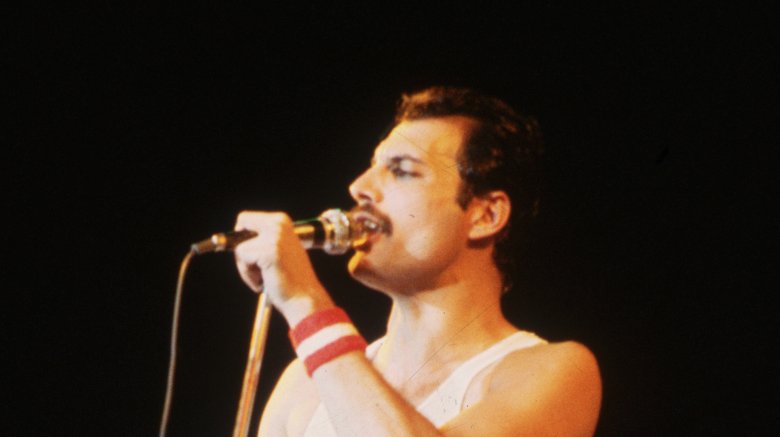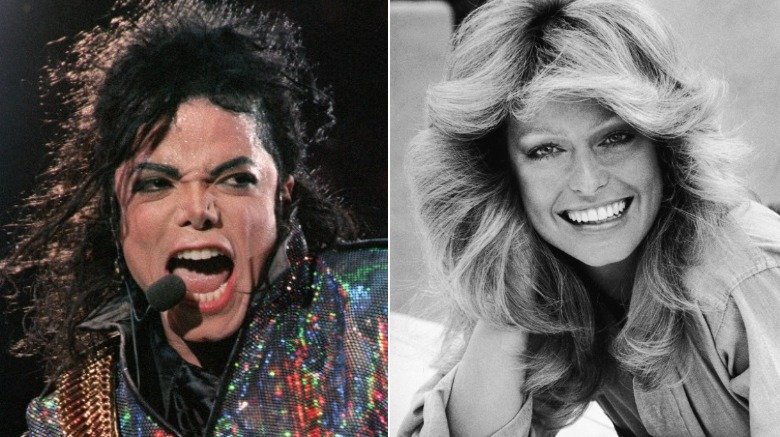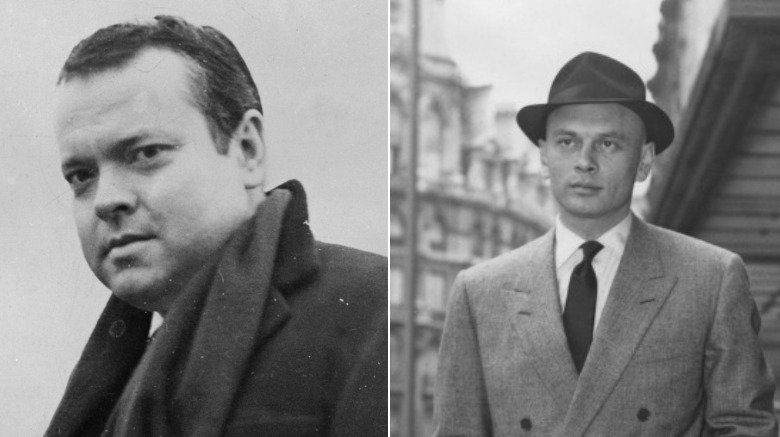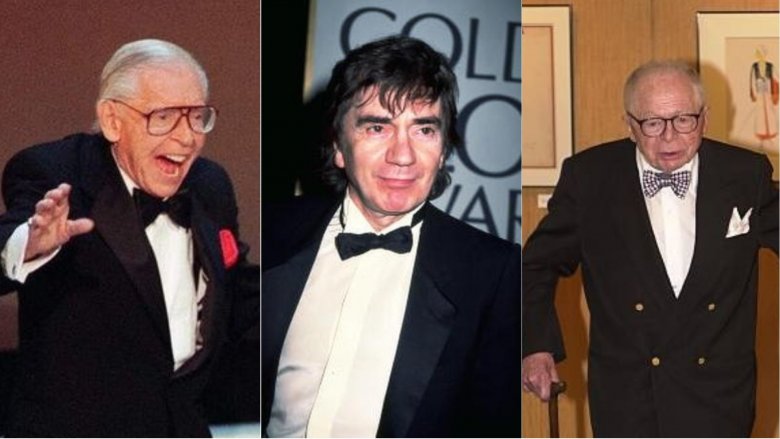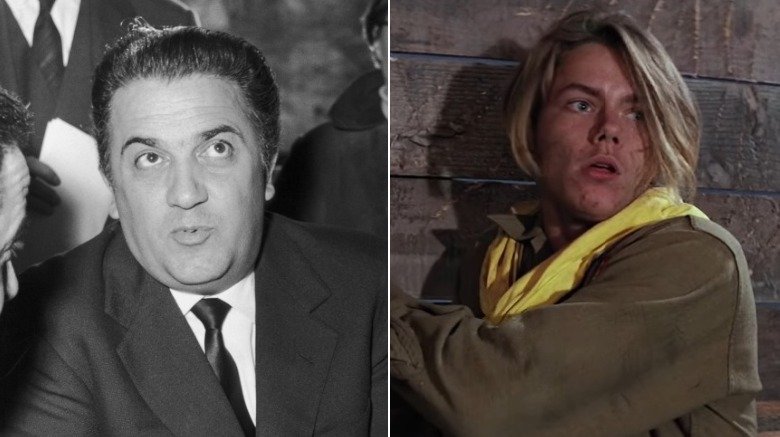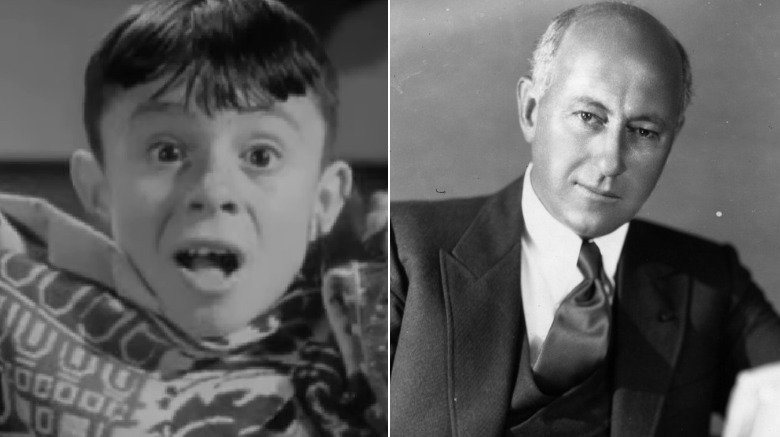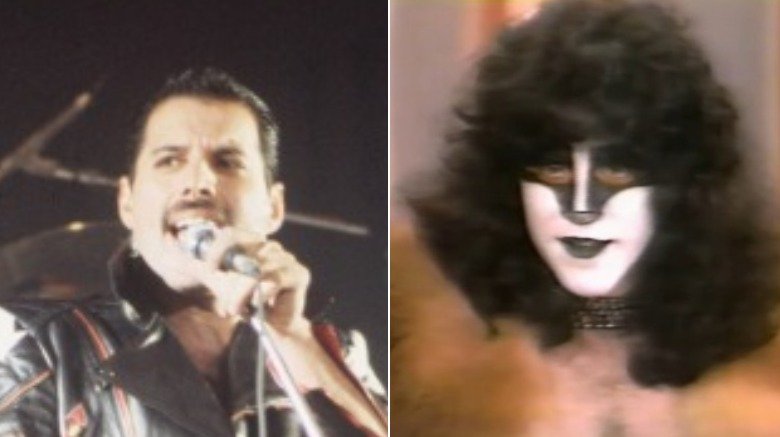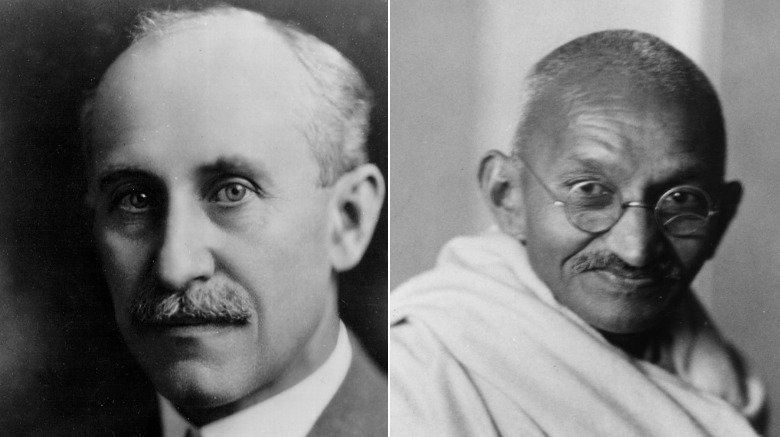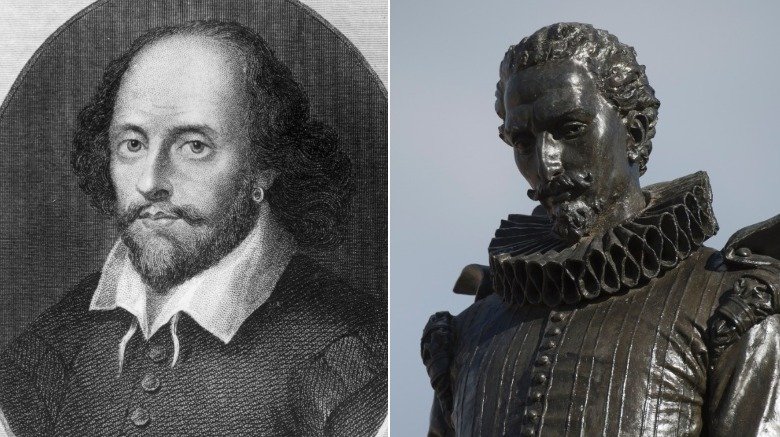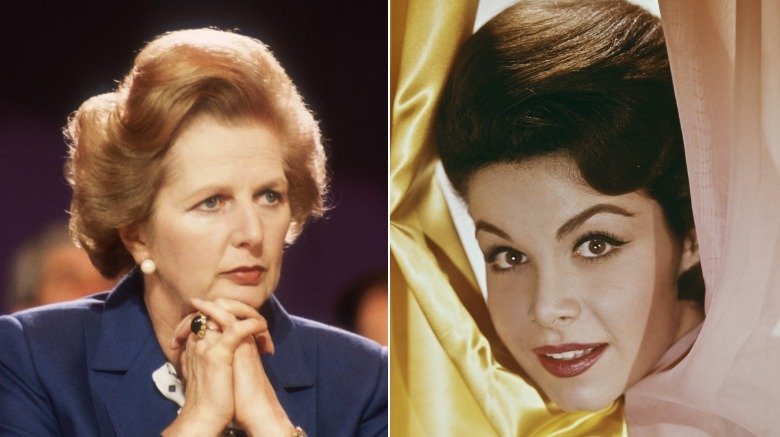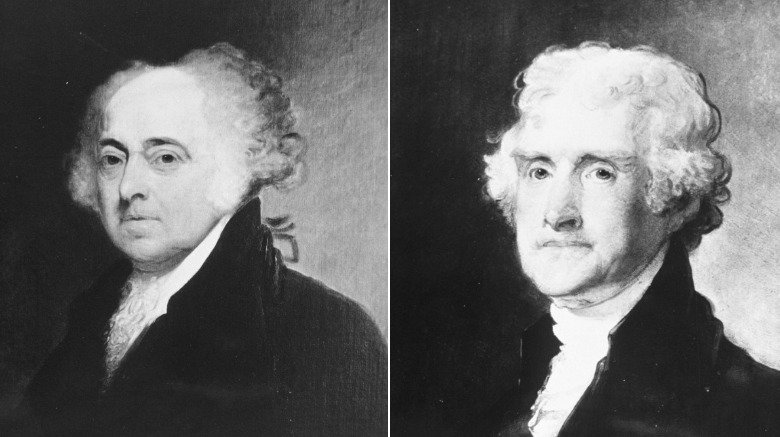Celebrities Who Freakishly Died On The Same Day
The writer Douglas Coupland once said "every single moment is a coincidence." Some people see things happening around them and immediately start picking out patterns while others see everything as random happenstance. Somewhere in the middle are those of us who see events unfold and wonder if maybe there's something more to it that we can't understand. If there's one thing that seems to get everyone struggling through this curse of coincidence, it's death patterns. Especially celebrity death patterns.
You've probably noticed in the media that whenever a very famous celebrity dies and then another dies within even a few weeks, people immediately start questioning what's going on. Even if we know it's just the natural course of things, it takes us aback. Despite the fact that two people die literally every second of every day, when we recognize the people it's as startling as it is sad. Is it indicative of something bigger and nefarious? Some massive celebrity conspiracy or sinister goings-ons? Probably not. But there are a lot of celebrities who inexplicably passed away on the same day as another celebrity. Sometimes fate deals a really weird hand.
Michael Jackson moonwalked out with Farrah Fawcett on June 25, 2009
Michael Jackson was arguably the biggest pop star in the world. He rose to fame with his brothers in the Jackson 5, and his solo career became a worldwide phenomenon. Despite a lot of controversy surrounding his personal life, he was long considered the King of Pop. As Statistic Brain notes, Jackson has sold 750 million albums which, between them, spent 4,458 weeks on the Billboard charts.
Farrah Fawcett became a household name in the 1970s on the show Charlie's Angels and was the model for one of the most famous pinup posters in history, considered by some to be among the top images evocative of American pop culture. That's a heck of an impact.
On June 25, 2009, Farrah Fawcett succumbed to a rare form of cancer at a hospital in Santa Monica. She had been diagnosed three years earlier and had made a video diary of her fight after news regarding her medical treatments began getting leaked; her passing was quickly overshadowed in the media by the death of Michael Jackson.
In the weeks after Jackson's death the public came to learn that his doctor had been administering numerous painkillers to him, according to the BBC. That, along with improper use of a surgical anesthetic, caused him to die at age 50.
Orson Welles and Yul Brynner left Hollywood on October 10, 1985
Orson Welles was the Quentin Tarantino of his time, insofar as he blazed onto the scene as a cinematic wonderkid blowing audiences away. His brilliance is evident in just how much influence he still has — everyone knows the (overblown) story of Welles' "War of the Worlds" radio broadcast, everyone knows the twist ending to Citizen Kane. There's barely a film class you can take without discussing Welles' style.
Later in life, Welles got a little weird. His final performance was as Unicron, a giant robot head, in the Transformers animated film in the 1980s. He was also notable for being a bit of a grouch and a man who liked his drink.
Welles passed away from a heart attack at the age of 70 on October 10, 1985, in Los Angeles, according to the New York Times. Across the country in New York City on the same day, Yul Brynner passed away after a battle with lung cancer.
Brynner, who had been born in Russia, came to America in 1940 and barely spoke a word of English, according to a profile in Cancer Today. By 1952, he had won a Tony Award for his performance in The King and I, the role that rocketed him to fame and won him an Academy Award as well when he reprised the role in the film version, essentially proving Brynner definitely was the King.
Milton Berle, Dudley Moore and Billy Wilder all passed on March 27, 2002
There must have been something bad in the water on March 27, 2002, because it became a triple threat for celebrity deaths. The comedians Milton Berle and Dudley Moore both passed on this day along with the filmmaker Billy Wilder.
Milton Berle rose to fame in the Golden Age of TV, back when you had three channels and you changed them by walking over to a 100-pound wooden box and turning a dial by hand. Biography.com points out that Berle's show was so popular it was the reason people actually bought TVs back in the day. You can't really be a bigger star than that. He died from colon cancer at the age of 93.
British actor Dudley Moore became famous in England before Hollywood took notice and cast him in films like 10 and Arthur, which made him a household name around the world. Tragically, Moore was diagnosed with an extremely rare brain disease called progressive supranuclear palsy in 1999, according to the BBC, when he was only 62. The condition was incurable and caused a number of complications including the pneumonia that ultimately killed him.
Pneumonia was also the official cause of death for Billy Wilder, according to the LA Times. Wilder was a bit of a Hollywood legend and holds the distinct honor of being the first person to win an Oscar for best writing, best directing, and best picture for The Apartment.
Federico Fellini and River Phoenix bowed out on October 31, 1993
Italian film director Federico Fellini has a legacy of pushing the boundaries of what film could say and do. Time described his film style as "brilliant, mad" visions, which is definitely something you'll see in his films when you watch them. They're imaginative and exciting and also very often surreal. Some had a tendency to be rather shocking as well, especially for the time they were created, and kind of sexy, too. If you have any love for film, you need to at least experience Fellini.
Fellini was 73 when he passed away, after suffering what the New York Times described as either heart failure or a heart attack on Halloween in 1993. Though internationally renowned, in America Fellini's death was overshadowed by the untimely passing of River Phoenix who died of a drug overdose at the age of 23 on the same day.
River Phoenix was a teen idol in the '80s leading into the 1990s and made his name in films like Stand By Me and Running on Empty. He was Dylan Minnette before Dylan Minnette was even born. Unfortunately, Phoenix was living a secret life contrary to his clean image. He went into seizures outside The Viper Room in LA, overcome by a lethal mixture of morphine and cocaine, according to UPI. His brother and sister were with him and called 911, but it was too late.
Carl Switzer and Cecil B. De Mille passed on January 21, 1959
You may not recognize Carl Switzer's name, but there's a good chance you'd recognize his face in character. Switzer played the iconic role of Alfalfa way back in 1935 as part of the Little Rascals, though they were called Our Gang at the time.
As Switzer grew older, he also grew out of the Alfalfa persona and eventually left acting behind altogether. He spent some time working on a farm and also trained hunting dogs. It was an incident over a debt relating to one of those same dogs that led to Switzer's death. Switzer went to the home of a man he believed owed him $50 over a lost dog. They argued and Switzer was shot, according to the LA Times, and died en route to the hospital. He was only 31.
On that same day in Hollywood, renowned director Cecil B. De Mille passed away from a heart ailment at age 77. The New York Times described De Mille as the P.T. Barnum of movies for his ability to turn film into spectacle. De Mille made more than 70 films in his career including The Ten Commandments and The Greatest Show on Earth, and essentially created modern Hollywood. His influence can't be overstated.
Freddie Mercury and Eric Carr played their final gigs on November 24, 1991
Not a lot of people have had the impact on music that Freddie Mercury had. From his incredible stage presence to his remarkable vocal range, Mercury and Queen are recognized as some of the greatest in rock and roll history. Rolling Stone listed Queen at 52 on their list of greatest artists of all time. CNN noted they sold 34.5 million albums in the U.S. alone. Much of that success was owed to Mercury.
Mercury was not nearly as flamboyant a personality in his private life as he was on stage, never one to grant many interviews or put himself out there. So when rumors began circulating in the 1980s that he was suffering health problems, he didn't address them. This persisted for years, and he looked sicker and sicker until finally, on November 23, 1991, Mercury released a statement acknowledging he had been diagnosed HIV-positive and had AIDS. And then, only a day later, Mercury passed away at his home, according to The Guardian.
Across the ocean, KISS drummer Eric Carr had fallen ill in early 1991. He was diagnosed with heart cancer, according to the LA Times, and despite undergoing both surgery and chemotherapy, he passed away on November 24, 1991. Carr had replaced Peter Criss in KISS back in 1980 and stayed with the band for 11 years, recording eight albums. He was only 41 when he passed.
Orville Wright and Mahatma Gandhi passed from history on January 30, 1948
Though Orville Wright and Mahatma Gandhi had almost nothing in common, both had a lasting influence over the world. Orville, along with brother Wilbur, is credited with essentially creating modern aviation. Gandhi, on the other hand, inspired civil rights around the world through his peaceful acts of civil disobedience. Both had rich, memorable lives that came to an end on January 30, 1948.
While many people had attempted flight before the Wright brothers, their historic 1903 flight was the first instance of a controlled, sustained flight in a powered, heavier-than-air vehicle, as the Smithsonian points out. It was a heck of a leap forward for mankind in the technological sense. It also paved the way for single-serving pretzels and tiny bottles of booze on flights, neither of which Wright saw before he passed of a heart attack at age 76.
As a devout Hindu and man of simple means, Gandhi was known for his passive resistance approach to political dissent. Gandhi was fighting for India's independence from Britain and against the oppression of its people. He also sought peace between Muslims and Hindus and was assassinated at the age of 78, according to History.
William Shakespeare and Miguel de Cervantes had their curtain call on April 23, 1616
Few celebrities by any definition of the word can hope to have the cultural impact of William Shakespeare (if Shakespeare was even real). He's almost beyond celebrity at this point, graduated to a genre unto himself. Likewise, Miguel de Cervantes has had a remarkable influence over literature and is easily among the greatest Spanish writers of all time. These are two big guns in the world of literature, so it's amazing that their deaths were recorded on the same day: April 23, 1616. But even though they were traditionally thought to have died on the same day, they also kind of didn't.
To fully understand the weirdness around the deaths of Shakespeare and Cervantes, you need to understand calendars. While most of the world uses one calendar these days, that wasn't always the case. So when we say Cervantes and Shakespeare both died on April 23, 1616, we need to acknowledge that Cervantes' death was according to the Gregorian calendar and Shakespeare's was according to the Julian calendar, as Britannica notes. In reality, they died 10 days apart. Thank you, bookkeeping.
To make things even more confusing, many scholars now think that Cervantes actually died on April 22. Our only record of his death is a burial certificate dated April 23, but Spanish customs of the time suggest he would have passed away the day before he was buried. So he and Shakespeare probably died 11 days apart, but that's still a pretty bad fortnight for European literature.
Margaret Thatcher and Annette Funicello passed away on April 8, 2013
Margaret Thatcher was the longest-serving prime minister of England in the 20th century, according to The Guardian. Her tenure was over 11 years, which is a decent run at any job, let alone running an entire country. History Extra argues that Thatcher's legacy can't be understated and that she was Britain's most important politician in the postwar era.
On April 8, 2013, Margaret Thatcher suffered a stroke at the age of 87. She'd had also been dealing with dementia leading up to her passing.
Across the ocean in America, actress Annette Funicello passed away from complications related to her multiple sclerosis at age 70. Funicello had been a staple of American pop culture since she was a teenager. She had been a member of the Mickey Mouse Club, but Funicello was most famous for the numerous "Beach Party" movies she made in the 1960s. If you've never seen them they're absolutely worth checking out, if only for the corny kind of 1960s innocence they portrayed. Those squeaky clean kids just wanted to have parties on the beach, man!
John Adams and Thomas Jefferson went out on Independence Day 1826
It's a bad day for politics in America when not one but two presidents die. That's what happened on the Fourth of July in 1826 when both John Adams and Thomas Jefferson, the second and third presidents of the United States, died on the most American holiday of all and exactly 50 years after the Declaration of Independence was signed.
As History notes, the two presidents died within hours of each other. Two Founding Fathers who had worked on the Declaration of Independence and helped create America itself. It's said that their friendship decayed into a rivalry for a time as their political views were at odds with one another. Things eventually calmed down after they were out of the presidency, and the two men rekindled a friendship that would last until their final days.
So strong was the friendship and the respect between the two men that, as Adams lay dying at age 90, his last words are said to have been "Thomas Jefferson still survives." Of course, there's not really any proof he said that, but either way, it wasn't true. Just five hours earlier, Jefferson had passed away at the age of 82.
